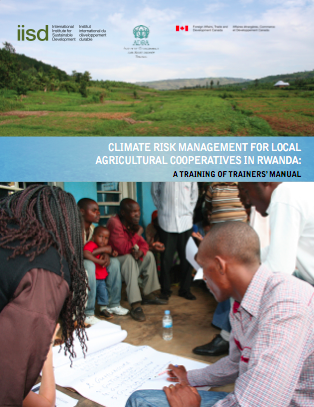Climate Risk Management for Local Agricultural Cooperatives in Rwanda: A training of trainers’ manual

This training of trainers’ manual helps cooperative members identify the main climate risks that can hamper their cooperative’s performance and identify solutions to minimize and, if possible, take advantage of these risks. It primarily targets NGO staff and local government officials working with agricultural cooperatives in Rwanda, but it can also be used in other contexts where farmers’ associations and local cooperatives are involved in value addition of agricultural products.
The manual takes a value chain approach through an analysis of the links between climate hazards and agricultural production along the length of a value chain (from production to marketing and consumption) identified as most important to the selected cooperative. The approach is adapted from the Community Based Risk Screening Tool – Adaptation and Livelihoods (CRiSTAL) framework, which was developed by IISD and three other partners to help project managers and planners design activities that support adaptation to climate variability and change at the community level. The manual provides step-by-step instructions for data collection and analysis and a case study of a local agro-cooperative focusing on the maize value chain. Data collection and analysis are organized according to a 10-step process divided into three stages that aim to:
Understand the business context: The “what,” “where” and “when” of the selected agricultural value chain. Understand the climate context: The location, frequency and intensity of climate hazards currently and in the future in the context of climate change in the area where the cooperative operates. Evaluate the implications of different climate hazards for the cooperative: The impacts of climate hazards on each stage of the selected value chain and the current and alternative responses to support climate adaptation. At the end of the training, the users should be able to formulate a set of recommendations for integrating climate considerations into the selected value chain commonly agreed among the participating members of the cooperative and that can be integrated into the cooperative’s business plan.